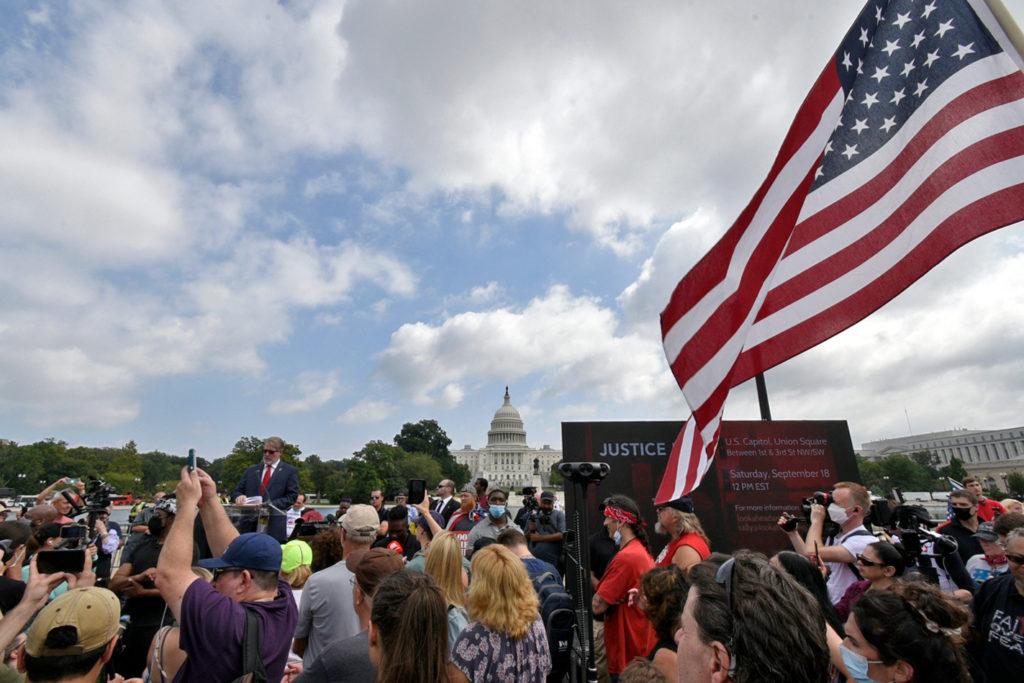More than 100 protesters gathered outside the U.S. Capitol complex Saturday to denounce the imprisonment of the insurrectionists who mobbed Capitol Hill on Jan. 6.
The U.S. Capitol Police tweeted that approximately 400 to 450 people assembled at Union Square for the Justice For J6 rally, but journalists and law enforcement officers outnumbered protesters, who demonstrated from noon to about 1:30 p.m. Protesters gathered to listen to speakers who compared the indictment of Jan. 6 rioters to the treatment of Jewish people in Nazi Germany and called for the prosecution of the police officer who shot and killed Ashli Babbitt, one of the Jan. 6 rioters.
More than 600 people have been arrested in the months following the riot, and five people, including Babbitt, have died in connection to the event. Officials activated the National Guard to prevent additional violence around the District in January, and troops occupied Foggy Bottom through President Joe Biden’s inauguration.
Matt Braynard, a GW alumnus and former Trump aide who organized the rally Saturday, said the protest was not meant to support the violence in January but sought to defend the “nonviolent” insurrectionists whom he called “political prisoners.” Seventy-one of more than 600 alleged Capitol rioters remain in jail, many of whom were charged with crimes like assault or conspiring to assault the Capitol, according to BuzzFeed News.
“This is about the many people who were there that day who have not been charged with violence, have not been accused of assaulting a police officer or destroying property and the disparate treatment they’ve received,” Braynard said during his speech. “This is about equal treatment under the law.”
USCP arrested four people before and during the rally Saturday, including two on weapons charges, according to NBC Washington. City officials installed temporary fencing around the Capitol and Supreme Court buildings in preparation for the event, and GW Police Department Chief James Tate said he would increase the number of officers and security personnel stationed on campus Saturday during the rally.
A Metropolitan Police Department spokesperson said MPD officers did not make any arrests and declined to say how many officers were assigned to monitor the rally. A USCP spokesperson did not immediately return a request for comment.
John Drechsel, a protester from Chillicothe, Mo., said he traveled to D.C. for the first time last week to be with other “like-minded” conservatives and advocate for rioters who are still being held without bail. He said he thinks the rally could amplify awareness for the rioters still in jail.
“I’m sure nothing’s really going to change, but hopefully a lot more people will become aware of what’s really going on, with these people rotting in jail with basically trespassing charges,” he said.
Lori Smith, a demonstrator from Atlanta, said she didn’t support the storming of the Capitol, but those who are still incarcerated for their participation in the riot are “political prisoners.”
“The only thing I see this doing is just raising awareness that political prisoners are actually now being taken in the United States, and just raise awareness to the public in general that it is possible, if you go out and engage in political activities, you could get arrested and be held for long periods of time because of your political beliefs and not for the crime that you committed,” she said.
Meanwhile, at Freedom Plaza, nearly 100 demonstrators gathered for a counter-protest against the Capitol rally. Protesters sported signs or clothing attire with messages like “J6 Insurrectionists Are Criminals” and “Black Lives Matter” and danced to music around the plaza.
Sarah Douglass, a counter-protester who was adorned in American-flag themed apparel holding posters with images of the January insurrection, said the jailed rioters are not political prisoners, but criminals.
[gwh_image id=”1148412″ credit=”Grace Hromin | Senior Photo Editor” size=”embedded-img” align=”none”]Sarah and Bruce Douglass display their signs at Freedom Plaza, standing in opposition to the Justice for J6 rally at the U.S. Capitol Saturday.[/gwh_image]
“This is patriotism,” Douglass said, pointing to her outfit. “This is not,” she said motioning to her poster.
She said the Jan. 6 insurrectionists subverted the democratic process to certify the presidential election results, and those who defend the arrested rioters aim to suppress all voters opposing Trump’s election. Douglass said she dressed in American colors to represent patriotism and progressivism because the Capitol protesters were trying to portray diversity and progressive ideals as anti-American.
“I’m going to get all star-spangled and show them that they can’t take patriotism from me,” she said. “They can’t label me as anti-American because I disagree with them.”
Sean Micheal Love, a demonstrator at the event at Freedom Plaza, said the counter-protest was a community-led effort promoted by D.C.-based community organizations like Good Trouble Collective, ShutDownDC and Remora House DC.
Love said organizers wanted the counter-protest to be non-confrontational, so protesters used music and celebration to spread a message of love and peace. He said the protest was meant to promote anti-fascist ideals, like solidarity and community.
“We hope to amplify the most marginalized voices and want to give people the space to know that there’s somewhere peaceful you can go and this community will keep you safe,” Love said.
Rod Green, a professor of economics at Howard University who attended the counter-protest, said the gathering was part of a larger movement against the mobilization of white resentment and represented the need to build multiracial unity to combat racist systems.
“This is an important battle to fight against fascism, fight against racism and build a revolutionary movement,” Green said. “That’s really why I’m here.”
Nicholas Pasion contributed reporting.








